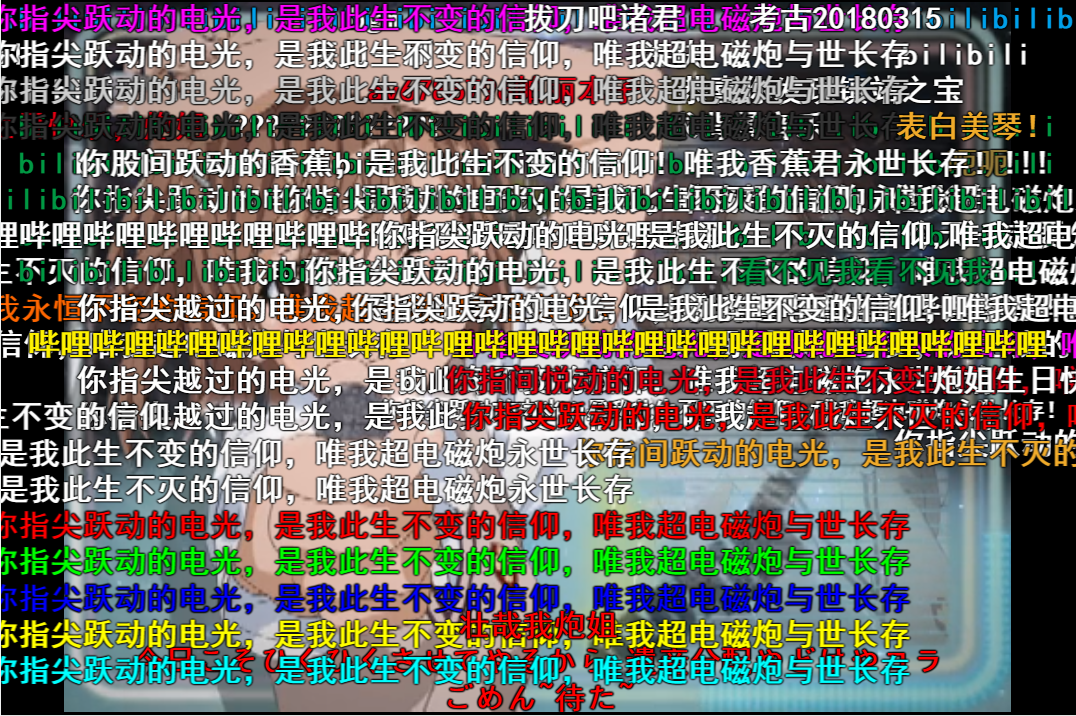Niconico and bilibili are the two leading streaming video sharing service provider who also feature overlaid comments called danmaku (弾幕).
The “Vesting of rights” part of Niconico Terms of Use states:
The copyright in text written by the Users on “niconico” shall be entirely transferred to the Operating Company at the time the Users write the text (rights provided in Articles 27 and 28 of the Copyright Act shall also be transferred to the Operating Company). However, the Operating Company shall license the User who wrote the text to use the relevant text. The Users shall not assert or exercise any rights (including moral rights) regarding the relevant text against the Operating Company and any parties designated by the Operating Company.
It is clear that “text written by the Users on ‘niconico'” includes 弾幕. Users can hardly boycott the disputable term since they have no better alternative choice.
Bilibili, the largest 弾幕 video service provider in China, however facing the problem of harsh censorship.
The idea of a “decentralized danmaku and subtitles service” is aimed to solve both problems. The 弾幕s contributed by the users should be in public domain, accessible by anyone, and the whole service should be immune to censorship. Let me explain.
The P2P file sharing technologies such as Bittorent protocol are mature and widely used to share videos, audios and other types of data. Today, most of movie or tv resources can be found in P2P file sharing communities. I am not arguing for these possibly piratical activities in this article. The point is users who have the video file stored in their local disks (legally or not) cannot enjoy the same experience they have on niconico and bilibili. It is not only that they cannot display 弾幕. Video player such as 弹弹play can grab 弾幕 from matched videos on bilibili or other provider. Apparently, the behavior of the video player involves some legitimization issues. It is also not a good solution in the aspect of user experience. People can only read, but not be able to contribute to the overlaid comments. The sense of being interactive, although is somewhat illusory, is crucial to the 弾幕 service users.
A decentralized danmakus and subtitles service should work like this. When a user watches from a local video file with a specific video player, they can pause and send a 弾幕 exactly as they would do on niconico or bilibili. When they send a 弾幕, the video player actually package the 弾幕 together with the hash value of the video file, the playback time, the suggest effects (color, font, language, alignment, etc), sign the package with the user’s key and broadcast it to the public. Some users would voluntarily compare the files to see if they have the same content yet different hash values (say different resolution) and mark them to be the same video, sign their discover and broadcast it. Users can choose to display the 弾幕s for the video file or a group of similar files, they can defined their own filter to display only the 弾幕s of, say, certain languages, they can choose to obey the effect suggestion or not, or mapping to some customized effects. There are many well-established decentralized infrastructure, say, DHT to be utilized to achieve this.
Like all decentralized permissionless systems, the main problem is security. The big companies, the authorities or anyone who is hostile to the service can flush the system with spam messages. Some wicked users may send disgusting 弾幕s making others feel bad. Centralized service provider like niconico or bilibili can manage this by blocking the accounts or even require the user to be real-named. Of course, this is not what we want. An ultimate decentralized solutions might be a decentralized reputation system backed by one or more blockchain communities. Concerning the fact that the decentralized reputation systems can be too costly for the application of 弾幕, there can also be some semi-decentralized solutions (something like Mastodon).
People sharing the same interests can group together as many sub-communities. Each sub-community have its own style of membership management, their members can broadcast the 弾幕 with their featured signature. Some independent agents provide rating and suggestion services, so that users can choose to display 弾幕s produced by certain groups or individuals. It is just like subscription to a youtube channel or follow someone on a social network. Reputed Fansub group (字幕组) can distribute all their works by sharing a string (like a bitcoin address). When working with Ethereum or other blockchain communities, one can even sell their high quality 弾幕s.
How do you think about it? Please leave your comment.

![新广电办发[2018]21号](http://test.yangruizhi.cyou/wp-content/uploads/2018/03/c17bebee4879a5f8-1024x470.jpg)